
Published: October 23rd, 2025 • Last Updated: October 23rd, 2025
Author: Ross Taylor on AskRoss.ca
When The Bank Says No, Private Mortgages In Canada Are Opening New Doors For Everyday Borrowers
If you told me ten years ago that private mortgages would become a relatively mainstream financing tool, I might have raised an eyebrow.
Back then, private lending was a last resort, usually reserved for borrowers coming out of bankruptcies or consumer proposals, or with credit profiles that made traditional lenders nervous.
But the mortgage world has changed. A lot.
In 2025, I’m seeing more clients; solid, responsible people; exploring private and alternative mortgage solutions not because they’ve made bad financial choices, but because the system has boxed them out.
The rise of private lending in Canada is no longer a quiet side street. It’s becoming a major road.
Let’s get into it.
Jump to a specific section in this article ↓↓
- What is a private mortgage in Canada?
- What is driving more Canadians into private mortgages?
- How long should you stay in a private mortgage?
- How can I transition from a private mortgage back to a bank mortgage?
- Is private lending becoming more legitimate?
- Can self-employed Canadians qualify for private mortgages?
- Why are private mortgages common after a consumer proposal?
- Why are people getting “stuck” in private mortgages?
- What are the risks and responsibilities of private lending?
- Are private mortgage interest payments tax-deductible in Canada?
- Advice from Ross Taylor Mortgages
- All of the FAQs in this article: Why Are More Canadians Turning to Private Mortgages
- Additional FAQs for Canadians

What is a private mortgage in Canada?
When we talk about private mortgages, we’re referring to short-term loans provided by individuals, Mortgage Investment Corporations (MICs), or private lending companies, not traditional banks or credit unions.
These mortgages are typically used by borrowers who don’t qualify for A- or B-lender financing. That might be due to credit issues, non-traditional income, or even the type or location of the property.
Private mortgages are often interest-only, with terms ranging from 6 to 24 months, and are intended as a bridge until the borrower can transition to a more conventional mortgage.
In the right circumstances, they can offer much-needed flexibility when the banks say no.
↑↑ Back to the list at the top ↑↑
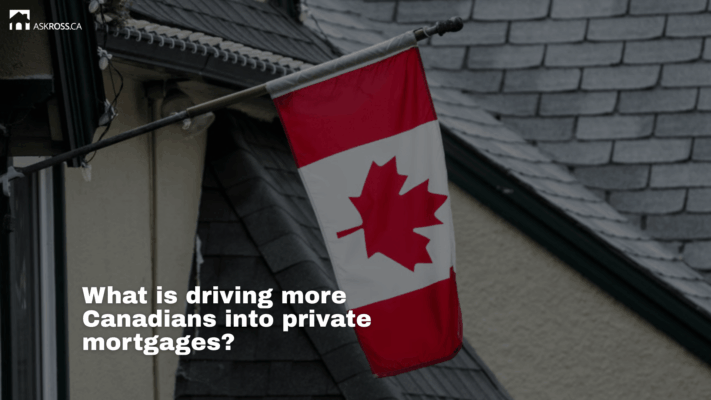
What is driving more Canadians into private mortgages?
Securing a mortgage with a traditional bank in Canada has become a tall order.
Between the federal B-20 stress test rules, high interest rates, and tighter lending criteria from the Big Six banks, a growing number of Canadians are finding themselves squeezed out of the traditional mortgage market.
And it’s not just folks with bruised credit anymore. The private lending space has evolved dramatically.
Borrowers today aren’t necessarily in financial trouble
Yes, we still work with many clients dealing with credit challenges, especially after a bankruptcy or consumer proposal. But these days, we are also seeing:
- Homeowners with strong equity but inconsistent income (hello, self-employed Canadians)
- People are turned down by banks simply because of the type or location of their property
- Borrowers who technically qualify for a mortgage, but not under the strict stress test (which currently requires proving you can afford rates 2% above what you’re actually paying)
As Jake Bannister of Glasslake Funding recently shared at the Canadian Mortgage Summit, the private mortgage space is now welcoming what he calls “near-prime” borrowers.
These are people who are responsible with their money but just don’t tick every box for a bank’s underwriter.
Sometimes, it’s just about timing.
Maybe you had a slower business year, or you haven’t filed two solid years of taxes. In those cases, a private mortgage can be a useful stopgap.
↑↑ Back to the list at the top ↑↑
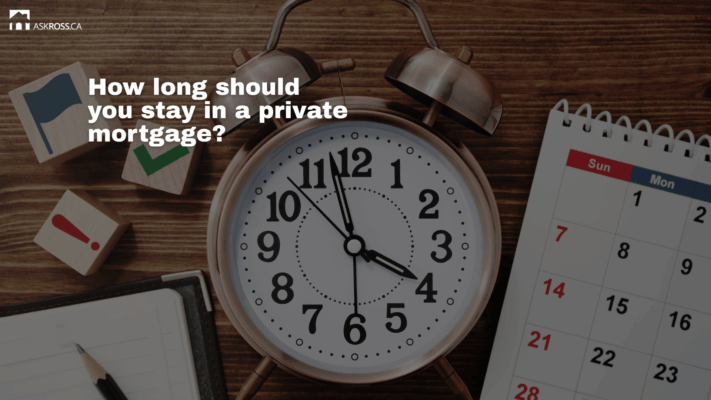
How long should you stay in a private mortgage?
Private mortgages are designed to be temporary. Full stop.
When we work with a client in this space, our number one focus is always the exit strategy.
The goal is to stay in a private mortgage only as long as needed, typically 6 to 24 months, then graduate back to an A- or B-lender.
But here’s the rub: more and more people are staying longer.
↑↑ Back to the list at the top ↑↑
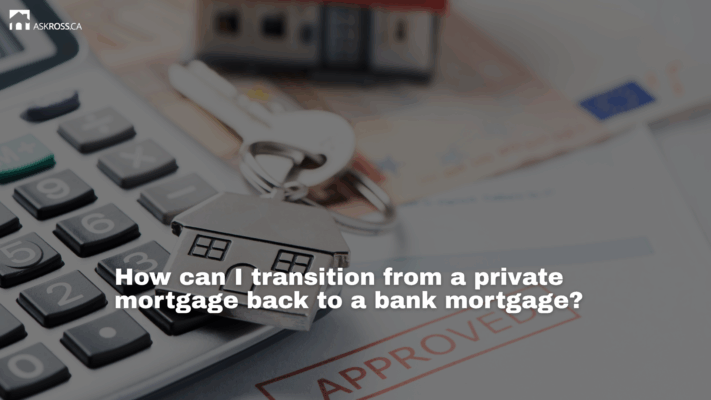
How can I transition from a private mortgage back to a bank mortgage?
This is the part that matters most: your exit strategy.
We always work with clients to build a plan to move out of their private mortgage as quickly as possible. Here’s what that usually involves:
- Rebuilding your credit with two solid trade lines and on-time payments
- Filing consistent income, especially if you’re self-employed
- Keeping property taxes and mortgage payments current
- Paying down high-interest debt to improve your debt ratios
Most clients move on to a B-lender or back to a bank within 6 to 24 months, depending on their financial recovery. Private mortgages are a bridge. The sooner we can help you cross it, the better.
↑↑ Back to the list at the top ↑↑

Is private lending becoming more legitimate?
Absolutely. This isn’t the “Wild West” of lending anymore.
At the Mortgage Summit, Aaron Duhra of PHL Capital highlighted the growing institutional presence in the space.
Today, some of Canada’s largest banks provide credit lines to private lenders. Mortgage Investment Corporations (MICs) have matured into regulated, professional organizations with investor oversight.
In fact, we often explain to clients that private lending is now a mainstream, institutionalized part of the mortgage landscape, just with different rules. You still need a knowledgeable guide to navigate it safely.
↑↑ Back to the list at the top ↑↑

Can self-employed Canadians qualify for private mortgages?
Absolutely. In fact, self-employed borrowers make up a significant portion of the private mortgage space today.
The banks tend to favour predictable, salaried income. So if you’re self-employed with strong cash flow but minimal declared income on your tax returns, getting approved by a traditional lender can be a challenge.
Private lenders take a different approach. They focus more on your equity, overall financial picture, and repayment ability than your tax filings. If you’re a self-employed homeowner with solid equity and a good explanation of your income, a private mortgage can be a realistic option.
↑↑ Back to the list at the top ↑↑
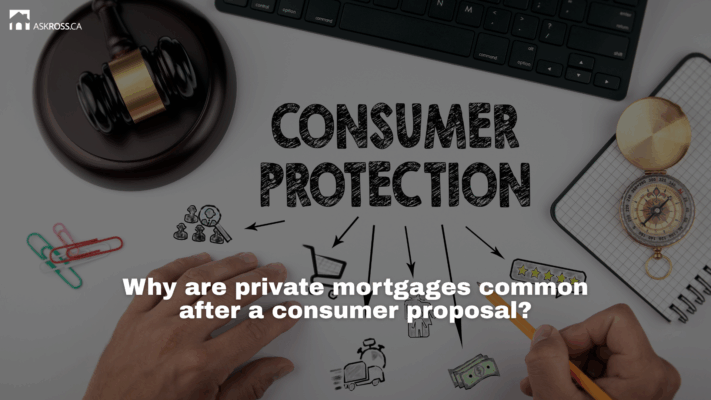
Why are private mortgages common after a consumer proposal?
Traditional lenders, especially the big banks, typically want to see at least two years of clean credit history once the proposal is fully paid off. They’ll also expect a minimum credit score, stable income, and a couple of well-managed trade lines.
But life doesn’t always wait two years. That’s where private and alternative lenders come in.
Some will consider your mortgage application immediately after the proposal is completed. In certain cases, we’ve even arranged financing while the proposal is still in progress, depending on income, equity, and overall financial picture.
Of course, these options come with higher interest rates and larger down payment requirements — usually 20 to 25 percent — but they can be a bridge while you rebuild your credit and get back into the prime lending world.
↑↑ Back to the list at the top ↑↑

Why are people getting “stuck” in private mortgages?
At the Mortgage Summit, industry leaders pointed out a rising trend. Renewals on private mortgages are climbing.
It’s not just because clients aren’t trying to get out. It’s that the path is more complex than it used to be.
Here are a few reasons we are seeing in our practice:
- Self-employed borrowers often need 2 to 3 years of consistent tax filings to prove sufficient net income for banks and other A-lenders.
- Debt consolidation clients may still be carrying high balances at renewal time, keeping them out of A-lender territory.
- Post-insolvency clients (those coming out of a bankruptcy or consumer proposal) need to rebuild their credit before banks will look at them again.
We tell every client up front: private lending can help, but without a solid exit plan, you could be facing expensive renewals you didn’t expect.
↑↑ Back to the list at the top ↑↑
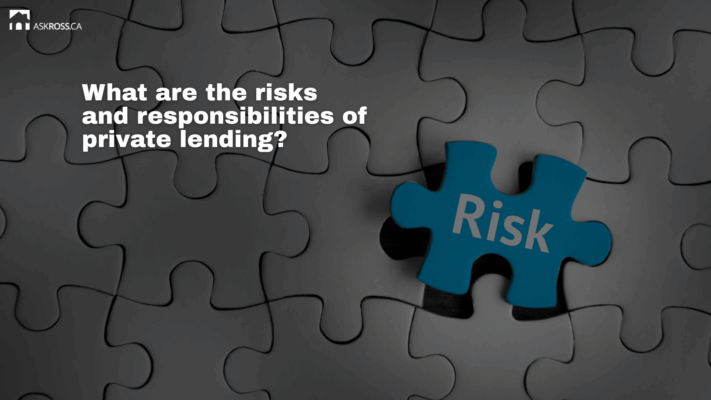
What are the risks and responsibilities of private lending?
Private lending can be a powerful tool when used ethically and responsibly. But make no mistake; it’s more expensive, and it’s not for everyone.
As a mortgage broker, I believe I have a fiduciary duty to make sure clients understand the full picture. That includes:
What are the costs typically associated with private mortgages?
- Higher interest rates (think 7% to 12% in today’s market)
- Lender fees and brokerage fees are upfront
- Legal and appraisal costs
- Renewal fees
It’s all manageable if it’s part of a strategy. It’s when borrowers go in blindly (or worse, are misled) that real harm is done.
We ensure transparency and education every step of the way
We always make sure our clients understand:
- The type of lender we’re working with (individual, MIC, institutional)
- The terms of the mortgage (interest-only, prepayment penalties, fees)
- The timeline to transition to more affordable financing
Not all private lenders are created equal. We dive into how to spot a good or bad private mortgage deal in our article here – 8 Key Things to Know Before Getting a Private Mortgage in Canada.
There are plenty of ethical private lenders.
But there are also a few bad actors out there; those who pile on fees or extend open-ended renewals to maximize their returns. We won’t work with those lenders, and neither should you.
↑↑ Back to the list at the top ↑↑
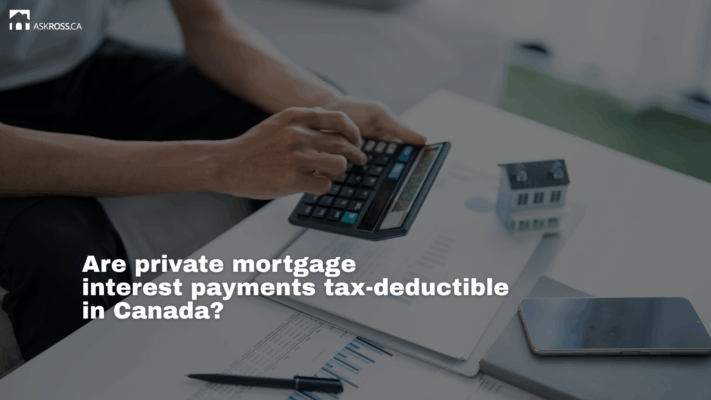
Are private mortgage interest payments tax-deductible in Canada?
This depends on how you use the borrowed funds.
If you’re using a private mortgage to buy or refinance your primary residence, then interest is not tax-deductible under current CRA rules. However, if the funds are used to:
- Invest in a business
- Purchase income-producing real estate
- Invest in the stock market (with proper structure)
Then the interest may be deductible. But this needs to be set up carefully, with documentation and guidance from an accountant or tax advisor.
If deductibility is important to you, bring it up early so we can work with your financial planner or accountant to ensure it’s structured properly.
↑↑ Back to the list at the top ↑↑

Advice from Ross Taylor Mortgages
If you’re considering a private mortgage, or you’ve been told it’s your only option, here’s what I want you to keep in mind:
- Private mortgages are a bridge, not a destination. Know your timeline and your exit plan.
- Not all private lenders are the same. Work with a broker who can separate the good from the bad.
- Cost matters, but so does strategy. Paying a higher rate for 12 months might make sense if it clears up your long-term finances.
- Ask questions. Understand every fee, every clause, and how this mortgage fits into your bigger financial picture.
Private mortgages aren’t inherently bad.
In fact, in the right situation, they can be incredibly helpful. But like any tool, they need to be used with care.
If you’re unsure whether private lending is right for you, reach out. Let’s take a look at your situation and build a plan that makes sense, for today and your future.
Because getting a mortgage isn’t just about approval. It’s about building a stable, sustainable financial life after securing your home.
Looking for more resources? You can check out my full guide to Private Mortgages in Canada or dive into my blog for real-world client stories, tips, and mortgage strategies tailored to Canadians like you.
↑↑ Back to the list at the top ↑↑

All of the FAQs in this article: Why Are More Canadians Turning to Private Mortgages?
What is a private mortgage in Canada?
- A private mortgage is a short-term loan from individuals or private lending companies instead of traditional banks, often used by borrowers who don’t meet A- or B-lender criteria.
What is driving more Canadians into private mortgages?
- Tightened bank regulations, high interest rates, and the federal B-20 stress test have made it harder for many Canadians, even those with good credit, to qualify for traditional mortgages.
How long should you stay in a private mortgage?
- Private mortgages are temporary solutions, ideally lasting 6 to 24 months, until borrowers can transition back to conventional financing.
How can I transition from a private mortgage back to a bank mortgage?
- Borrowers should rebuild credit, show consistent income, pay down debt, and stay current on taxes and payments to move back to a bank or B-lender within 6 to 24 months.
Is private lending becoming more legitimate?
- Yes, private lending has evolved into a regulated, institutionalized space with oversight, with many banks now providing credit to private lenders.
Can self-employed Canadians qualify for private mortgages?
- Yes, self-employed individuals often qualify because private lenders assess overall financial health and equity rather than just tax filings.
Why are private mortgages common after a consumer proposal?
- Private lenders may approve borrowers soon after completing a consumer proposal, offering a bridge until they rebuild enough credit to qualify with banks.
Why are people getting “stuck” in private mortgages?
- Many borrowers stay longer due to the need for consistent income proof, lingering debt, or slow credit recovery after financial setbacks.
What are the risks and responsibilities of private lending?
- Private mortgages come with higher costs and fees, making it essential for borrowers to understand all terms and work only with ethical lenders.
What are the costs typically associated with private mortgages?
- Costs include 7%–12% interest rates, lender and brokerage fees, legal fees, appraisal fees, and potential renewal charges.
Are private mortgage interest payments tax-deductible in Canada?
- Interest is only deductible if the borrowed funds are used for investment or income-producing purposes, not for a primary residence.
↑↑ Back to the list at the top ↑↑
Additional FAQs for Canadians
How do I know if a private mortgage is right for me?
- It’s best for those who can’t currently qualify for traditional financing but have equity and a clear exit plan to return to conventional lending.
What is the difference between a private lender and a B-lender?
- A B-lender is typically a regulated financial institution offering near-prime loans, while a private lender can be an individual or corporation offering short-term, flexible financing.
Can I refinance my home through a private lender?
- Yes, many homeowners use private mortgages to refinance for debt consolidation, renovations, or to bridge gaps while improving their financial profile.
Are private mortgages regulated in Canada?
- Yes, private lenders and Mortgage Investment Corporations (MICs) operate under provincial and federal oversight, though regulation levels vary by province.
How can I avoid predatory private lenders?
- Work with licensed mortgage brokers, read all terms carefully, and verify the lender’s reputation before signing any agreements.
Do private mortgages impact my credit score?
- Yes, payment history and responsible management of a private mortgage can help rebuild or improve your credit profile over time.
↑↑ Back to the list at the top ↑↑

Ross Taylor Mortgages
If you want great service from someone you can trust – reach out to us today.
Get quick answers to your questions, no matter how difficult – 7 days a week.

 Apply For a Mortgage
Apply For a Mortgage